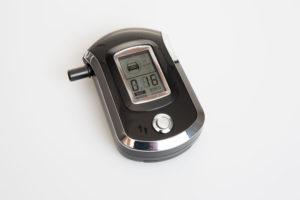
Everybody knows that drinking alcohol raises your blood alcohol content, but it doesn’t happen instantaneously. It takes a while for alcohol to be absorbed in your blood stream, so your BAC is still rising even after you’ve taken your last sip of alcohol. Because of this process, a late rising BAC can sometimes be used to argue your case in a drunk driving arrest. Today, we take a closer look at the rising BAC defense.
Rising BAC
As we mentioned above, you aren’t at your drunkest the moment you finish that last beer; it actually takes some time for that alcohol to make it’s was into the bloodstream. This means you continue to get drunk after you stop drinking, so waiting 30-60 minutes after your last drink to drive home can actually mean you’re driving at a higher BAC than had you left right away. If you are eating while drinking, the alcohol absorption process can take even longer.
As you are aware, the legal driving limit is below 0.08%. But, since we know that blood alcohol content keeps rising even after your last drink of alcohol, there’s a scenario where you get in the car with a legal BAC, you’re stopped by a police officer, and eventually end up taking a breathalyzer that shows you’re over the legal limit, even though you weren’t when you first got in the car. The time in which is takes to be administered your breathalyzer is crucial.
Another important aspect to remember is that this defense would really only be a potential option for select individuals with specific BACs. If you’re pulled over and blow a 0.24, that last beer didn’t push you over the edge, as it’s clear that you were over the legal limit before you got in the vehicle. However, if it takes a half hour to get to your breathalyzer and you blow a 0.085, there’s a chance you can pursue the rising BAC defense if your attorney can challenge that you were under the legal limit while driving. In fact, there are three factors that need to be present in order for an attorney to consider using the rising BAC defense.
Near The Legal Limit – As we mentioned above, that last beer is only going to increase your BAC by a little bit, so if you’re well over the legal limit, this defense won’t work for you.
Breathalyzer Delay – If a cop tests you 10 minutes after you’re pulled over, you might be out of luck, but if it takes 45-90 minutes for you to be administered a breathalyzer, you may have a case.
No Other Aggravating Factors – Even if you’re near or just slightly above the legal limit, if there’s clear signs of intoxication, like slurred speech or intoxication, you can still be prosecuted for drunk driving regardless of your BAC level.
Clearly the rising BAC defense would only work for a narrow number of DUI suspects, but the best way to know if it may be an option for you is to talk with an experienced DUI lawyer.





